In this section: Marlon Parker, Simone Abramson, Nonhlanhla Mokoena, Albert Modi and more…
Marlon Parker, technology lecturer, Cape Peninsula University of Technology
 By the time he had finished high school, Marlon Parker had never touched a computer. In fact, his first job was pushing shopping trolleys. Today he is completing his doctoral research in information technology following on from his bachelor and master’s degrees (cumlaude). His thesis is centred around a project he spearheaded in the Cape Flats in which rehabilitated gang members and drug addicts use social multimedia technologies to council people around the country.
By the time he had finished high school, Marlon Parker had never touched a computer. In fact, his first job was pushing shopping trolleys. Today he is completing his doctoral research in information technology following on from his bachelor and master’s degrees (cumlaude). His thesis is centred around a project he spearheaded in the Cape Flats in which rehabilitated gang members and drug addicts use social multimedia technologies to council people around the country.
Parker grew up on the Cape Flats and was a heavy drinker by the time he was 17. He has a brother in jail for drug possession and dealing. Your circumstances do not determine your destiny, Parker says. He personally trains recovered and reformed drug addicts on how to use technology such as MXit to do a form of peer-counselling using cellphone-based IM andsocial network. His work is groundbreaking and he manages to do this with no corporate or government funding.–Hendri Pelser
Lunch spot: Azure, Twelve Apostles, Cape Town
Simone Abramson, Inventor
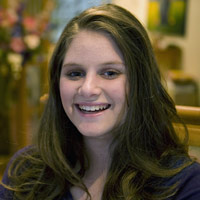 Shoprite Checkers Woman of the Year Finalist, Glamour Magazine Woman of the Year, HIP2B2 Brand Ambassador and a high school student. Huh? Doesn’t seem to add up. Well, unless you are Simone Abramson. At the tender age of 16, Abramson made a major breakthrough when she invented an alternative to the current human identification methods. The Cape Town schoolgirl invented a photographic system based on the internal properties of the eye, which can’t be forged or changed.
Shoprite Checkers Woman of the Year Finalist, Glamour Magazine Woman of the Year, HIP2B2 Brand Ambassador and a high school student. Huh? Doesn’t seem to add up. Well, unless you are Simone Abramson. At the tender age of 16, Abramson made a major breakthrough when she invented an alternative to the current human identification methods. The Cape Town schoolgirl invented a photographic system based on the internal properties of the eye, which can’t be forged or changed.
The inspiration for the project came when her grandfather was diagnosed with diabetes, which was confirmed using fundus photography. This is a common technology that photographs the back of the eye, or the ‘fundus’ revealing the health of the optic nerve, vitreous, macula and retina. With her method in place, Abramson entered Eskom’s Expo for Young Scientists in 2007, using her grandfather’s medical records as inspiration for her project. But now that she’s all famous, do her teachers and students treat her differently?
‘Not really’ says Abramson, who is now 18. ‘It’s like a job I do. I don’t let it worry me’. Her ground-breaking project is in its final developmental stage. She has patented her idea but has not yet sold the rights because she hasn’t received interest from the ‘right kind of people.’
And finding the right kind of people is not going to be easy, considering who her idol is.
‘Nelson Mandela’, she quips, ‘because he was so determined to do something that nothing could’
Lunch spot: Primi Piatti,anywhere
Nonhlanhla Mokoena, nuclear physicist, Koeberg Nuclear Power Station
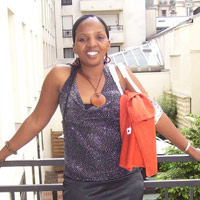 Nonhlanhla Mokoena is a posterchild for perseverance. As a girl, she sold sweets at school and later worked as a domestic worker to supplement the household income. At 15, Mokoena fell pregnant and decided to keep the baby. With dogged determination and the help of an encouraging grandmother and supportive teachers, she went on to matriculate, and continued to university. She is currently working towards a master’s in science.
Nonhlanhla Mokoena is a posterchild for perseverance. As a girl, she sold sweets at school and later worked as a domestic worker to supplement the household income. At 15, Mokoena fell pregnant and decided to keep the baby. With dogged determination and the help of an encouraging grandmother and supportive teachers, she went on to matriculate, and continued to university. She is currently working towards a master’s in science.
Now a nuclear physicist at Koeberg Nuclear Power Station, Mokoena is also in demand as a motivational speaker and mentor. When talking to learners from disadvantaged backgrounds, Mokoena urges them to think broadly and keep their eye on the goal. ‘It’s not about riches’, she says, ‘it’s
about the mind.’ —Faranaaz Parker
Lunch spot: Moyo, Stellenbosch
Lebogang Mokwena, researcher, Centre for Policy Studies
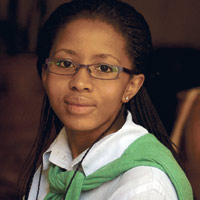 Lebogang Mokwena is already carving a name for herself in research and academic circles, historically dominated by men. She is well read and travelled. Her academic achievements include a master’s degree in poverty and development from the Institute of Development Studies at the University of Sussex. She also completed studies in law and politics at the University of the Witwatersrand. In 2004 Mokwena was the first black female student at Wits to receive the Yusuf Dadoo prize, which is awarded annually to the top undergraduate student in the department.
Lebogang Mokwena is already carving a name for herself in research and academic circles, historically dominated by men. She is well read and travelled. Her academic achievements include a master’s degree in poverty and development from the Institute of Development Studies at the University of Sussex. She also completed studies in law and politics at the University of the Witwatersrand. In 2004 Mokwena was the first black female student at Wits to receive the Yusuf Dadoo prize, which is awarded annually to the top undergraduate student in the department.
She was later awarded the Joe Ebrahim Prize for the top honours student by the same department.Mokwena, the youngest of six, grew up in a single-parent household in Diepkloof, Soweto. She has a keen interest in literature and writes a column on South African politics for a Johannesburg-based daily newspaper.–Hendri Pelser
Lunch spot: The Salvation, Melville, Johannesburg
Albert Modi, Chief executive, Moses Kotane Institute
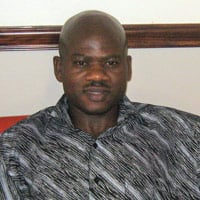 Albert Thembinkosi Modi’s mother is illiterate. But she instilled a passion for learning in her son. Following a scholarship to study horticulture and crop science at the University of Fort Hare, Modi went on to complete his master’s and PhD. The latter qualification was made possible through the prestigious Fulbright Scholarship.
Albert Thembinkosi Modi’s mother is illiterate. But she instilled a passion for learning in her son. Following a scholarship to study horticulture and crop science at the University of Fort Hare, Modi went on to complete his master’s and PhD. The latter qualification was made possible through the prestigious Fulbright Scholarship.
Modi believes crop science is one of best ways to develop rural communities and most of his research looked at indigenous agricultural systems and making these commercially viable. An initiative he spearheaded now supplies Woolworths with certified organic wild African potatoes. He recently joined the Moses Kotane Institute as chief executive, in which he aims to address the shortfall of science, engineering and maths leaders.
His vision for the institute is to ‘orchestrate innovative interventions that render efficient and sustainable service delivery’. He believes that
the only sustainable way to alleviate poverty is though education. —Hendri Pelser
Fikiswa Majola, Chemical engineer, MTN Sciencentre
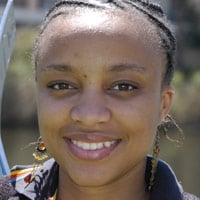 Fikiswa Majola is a girl who loves to ‘blow things up’. She studied chemical engineering at the Cape Peninsula University of Technology but decided
Fikiswa Majola is a girl who loves to ‘blow things up’. She studied chemical engineering at the Cape Peninsula University of Technology but decided
not to take the obvious career path. While studying, she tutored students at a Nyanga school in maths and science, and worked as a volunteer at the MTN Sciencentre.
After graduating, she took up a fulltime post at the centre. These days Majola works as a facilitator at the Sciencentre, where she not only wows young audiences, but also demonstrates the laws of science and chemistry; she has taken her show on the road, attending SciFest and Sasol TechnoX, and she has won a silver medal for ‘Most Wow Show. Majola also mentors learners who’ve received the Walter George Mostert Scholarship. She intends to study education part-time while continuing her work with the Sciencentre and taking her show to kids in rural areas.–Faranaaz Parker
Lunch spot: Gourmet Burger, Cape Town
Ndivhuwo Luruli, deputy director, Department of education
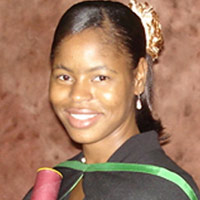 Nothing is impossible for Ndivhuwo Luruli. Born in a rural area in Limpopo, she is a firm believer you can do anything if you want it bad enough. Luruli studied her BSc in Conservation Ecology at Stellenbosch University. And with a personality thriving on a challenge, she not only passed it with distinction but also went on to get a master’s degree (cum laude).
Nothing is impossible for Ndivhuwo Luruli. Born in a rural area in Limpopo, she is a firm believer you can do anything if you want it bad enough. Luruli studied her BSc in Conservation Ecology at Stellenbosch University. And with a personality thriving on a challenge, she not only passed it with distinction but also went on to get a master’s degree (cum laude).
Investigating the large and smallscale distribution of the invasive Argentine ant in South Africa, her love of research led her to the National Research Foundation before being appointed, at the age of 27, a deputy director in the department of education. —Liesl Venter
Lunch spot: Doppio Zero, Rosebank, Johannesburg
Nomakwezi Mzilikazi, Lecturer, department of zoology, Nelson Mandela Metropolitan University
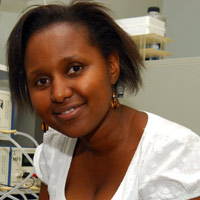 Regarded as Africa’s first black evolutionary physiologist, Nomakwezi
Regarded as Africa’s first black evolutionary physiologist, Nomakwezi
Mzilikazi has already left her mark in the world of science. Raised in the dusty village of Idutywa in the Eastern Cape ‘where there was not even a laboratory at her local school’ she found herself excelling in the field of biology.
An expert on the behaviour of small animals such as the elephant shrew and bush babies, the first microscope she saw was when she arrived at university. With a PhD in hand Mzilikazi was the winner of the first African Women Scientist. Fellowship at the department of science and technology’s Women in Science. Awards in 2003 and was also the first black woman appointed at the department of zoology at the Nelson Mandela Metropolitan University, where she lectures.– Liesl Venter
Lunch spot: The Blue Water Café, Port Elizabeth
Irma du Plessis, Researcher, Wits Institute for Social and Economic Research
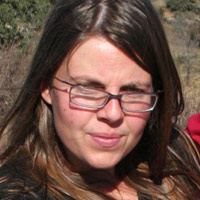 Irma du Plessis does not describe herself as a natural student. But with five degrees under her belt–nearly all cum laude –it’s a bit hard to believe.
Irma du Plessis does not describe herself as a natural student. But with five degrees under her belt–nearly all cum laude –it’s a bit hard to believe.
She obtained her BA from the University of Pretoria in 1993. She then completed an interdisciplinary honours in philosophy and Afrikaans from the same university and was awarded an Abe Bailey Overseas Scholarship. This was followed by a second honours degree in Industrial Sociology at RAU in 2000 and an MA in Literary Theory through the University of Pretoria in 2002.
But what’s interesting about this social and cultural analyst is not only her impressive academic record, it’s what she studies. Du Plessis is on a quest for of the kind of understanding of the self that is often hidden. She examines aspects of contemporary. South African society to try to make sense of the time and place we inhabit.
Now a researcher at the Wits Institute for Social and Economic Research (Wiser), where she examines aspects of contemporary South African society to try to make sense of the time and place we inhabit. —Hendri Pelser
Lunch spot: La Rustica, Houghton, Johannesburg
Jennifer de Beyerm, Scientist
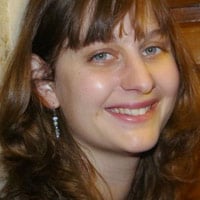 A lack of excellence is what inspires one to action. It is this belief that drives 24-your-old Jennifer de Beyer whose love of science has seen her excel in the field. Currently studying for a DPhil in systems biology at the University of Oxford, with funding from the Commonwealth Scholarship Commission, she is also one of a handful of students who presented at the 13th Workshop of the International Study Group for Systems Biology in 2008.
A lack of excellence is what inspires one to action. It is this belief that drives 24-your-old Jennifer de Beyer whose love of science has seen her excel in the field. Currently studying for a DPhil in systems biology at the University of Oxford, with funding from the Commonwealth Scholarship Commission, she is also one of a handful of students who presented at the 13th Workshop of the International Study Group for Systems Biology in 2008.
Raised in Pinelands, in the Western Cape, De Beyer was raised with a passionate interest in the world, in which learning and exploring everything became instinctual. Coupled with her belief that exploration and an appreciation for creation draws one closer to God, she is living her dream researching biological questions.–Liesl Venter
Lunch spot: Hillcrest Berry Farm, Stellenbosch